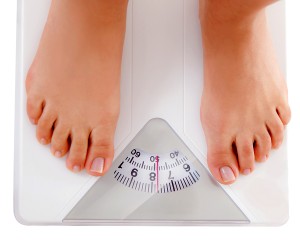I was talking with a friend the other day about weight loss and new challenges. This friend has just recently had a baby and she is determined to get her pre-baby body back. Unfortunately her exercise has to wait a little bit longer as she had a c-section, but she has already slowly started the ball rolling by increasing her physical activity and concentrating on her nutrition.
I shared with her that for me personally I havent weighed myself in quite a while, sure I would like to lose a few kilos but I think most women do. The most important thing for me at the moment is getting my fitness levels in peak condition and enjoying being able to whatever I want to with ease and without flaring my old injury.
“No no I plan to use the scales a lot” my friend said.”When so and so lost all her weight I liked what she did, she weighed herself everyday and she used this to monitor herself. If she was heavier then she would cut back on what foods she was eating”
I trained a common friend of ours and she lost quite a bit of weight, she did it slowly and made a way for it to fit into her lifestyle (aka two young children).
Now i’m quite torn on the topic of whether you should weigh yourself everyday or not. My Personal Trainer hat knows that body weight fluctuates daily and this is natural. It has also seen the detrimental affects of clients who get fenatical about numbers on the scale to the point of disappointment and despair when really they could just be retaining fluid.
Changes in weight can be based on numerous factors including hydration (loss or gain of water weight) and contents of your digestive system (how recent the last meal and bowel movements were).
To get accurate weigh-ins, consistency is key. Always do your best to duplicate the weigh in conditions every time: Fed or fasted, clothed or not clothed, bladder empty or full, pre or post workout, morning or evening, high carb or low carb day, amount of fluids ingested, diuretic substances consumed, etc. If you control for all these factors, you’ll get more accurate weight and body composition data.
I think it is quite possible to get obsessed with the scales and focusing solely on those pesky numbers that sometimes never seem to budge. The thing is sometimes you work so hard, yet you don’t see any difference on the scales, you get so depressed that you go eat some junk food and give up. However when you see a difference you get so happy and motivated that you continue.
On the other hand, I do believe that checking your weight is a form of self monitoring and maintenance. Whenever I want to lose weight I make sure I not only go by my clothes but I weight myself weekly as a check in. In these circumstances where you are in the right head space it can be quite useful for weight control.
It reminds me of a superbly interesting yet quite out there book called the 4 hour body (Tim Ferriss author of the 4 hour work week, I will go into more detail about 4 hour body in another post). One of his case studies included a man who monitored his weight every day, he altered his diet if he had put on weight and each day he set himself a target of what weight he wanted to be. For scientific purposes (or so he said) he did not include one bit of exercise. Now I don’t actually think that’s healthy at all and I can only imagine what his body composition would have been like, but for him it worked. He graphed all his results and documented everything, you could see on his graph the weight going down. I told you, out there.
So from a self-monitoring and discipline for weight control point of view I think scales are useful. However if you are the type to get obsessive and let the numbers control you, then I suggest you stay away, use measurements or a tight fitting outfit as an alternative.
